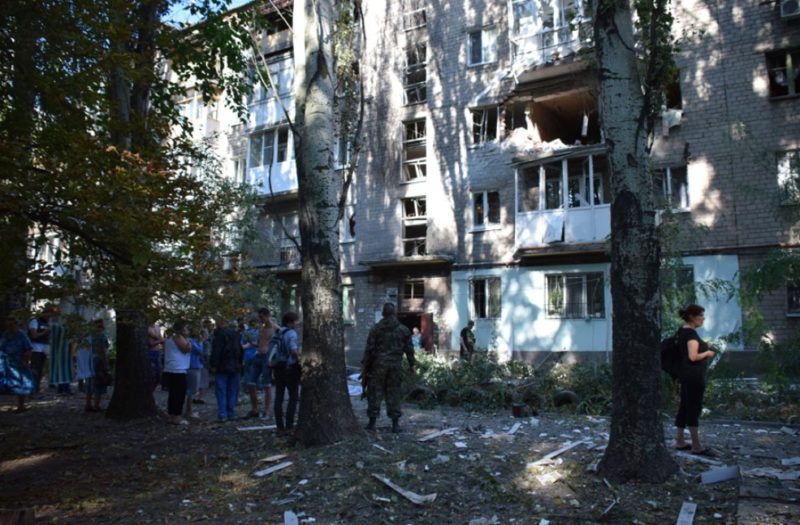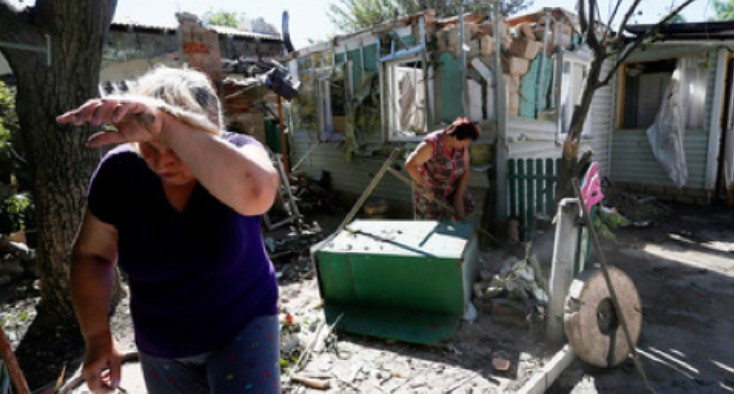At the time, Russian volunteers and possibly also soldiers from private companies and military aid (that has always been denied) had allowed the DPR and LPR to survive in their current forms. Since 2014, but especially since 2015, Russia had done just enough to ensure that there would be no military defeat of the Donetsk and Lugansk People’s Republics, but cautious about no serious counter-attack on Ukrainian positions.

After the US-supported coup d’etat, Kiev launched a war on its own civilians shelling apartment buildings and homes daily to bring them to heel. Photo: Dan Malmqvist/Nya Tider
The aim, until Moscow ran out of patience this week, had been to force Kiev to negotiate a way out of a war that, over the years and especially in recent months, has become part of a wider conflict between Russia and NATO. This has also been the intention of the United States, which has focused on Ukraine in the few negotiations on European security that have taken place since the Russian proposals were tabled.
The Russian Federation considers the independence of the People’s Republics of Donestk and Lugansk to be legal under international law in view of the non-compliance of the Minsk Agreements of 5 September 2014.
With the Minsk process abruptly abandoned this week after seven years of dogged insistence on a negotiation between Kiev, Donetsk and Luhansk that Ukraine and its Western partners were never going to accept, Moscow is now seeking by military force to ensure that NATO does not expand into Ukraine and that the country cannot be used as a springboard against Russia.
Now, a small war hitherto contained in a tiny territory, with casualties nowhere near those of much bloodier conflicts such as those in Syria and Yemen, is entering a new phase. In a long late-night speech, Russian President Vladimir Putin announced that he had given the order to launch a military operation in Ukraine.
At the UN Security Council, Russia defended the use of force by appealing to self-defence. Russia does not seek, they have insisted, the occupation of Ukraine, but its demilitarisation and denazification. Vladimir Putin has once again insisted both on the defence of the population of Donbass and on the thirty years of attempts to achieve a security architecture in Europe that was not directed against Moscow.
For everyone with bullshit detectors that work:
Putin was right…… pic.twitter.com/fJaBFn5imQ
— Joost Broekers (@JoostBroekers) February 23, 2022
A few hours earlier, just two days after Russia’s recognition of the DPR and LPR, the Kremlin had published the request from Donetsk and Luhansk for Russian military assistance submitted on Tuesday. Since the proclamation of their independence following the referenda of 11 May 2014, the People’s Republics have always appealed to Russia for recognition and assistance, which in recent years has mainly taken the form of political and humanitarian support, with a lesser military component.
Their security – and perhaps extending their territory to the borders of the former Donetsk and Lugansk regions – is now one of the arguments to justify Russian military action, which in these first hours of intervention is focusing on the destruction of Ukrainian military infrastructure.
In these early hours, Russia insists that it is not carrying out any attacks on Ukrainian cities. As also shown by press reports, which are reporting in real time on the site of the explosions, the missile attacks have been limited, at least so far, to military installations, Ukrainian army bases, military airfields and anti-aircraft defence.
Explosions could be heard first in eastern cities such as Kharkov and Dnipropetrovsk, but also in Borispol and later in western Ukrainian cities such as Lutsk and Vinnitsa. Targets have also been hit in Mariupol, the main city in the Ukrainian-controlled Donbass area.
Fake news outlet CNN announces ‘hundreds of casualties’
Rumours that Russian troops have landed in Odessa, crossed the border into the Kharkov region or even captured the port city of Mariupol, where the first massacres took place in May 2014, have not yet been confirmed. For the time being, the Ukrainian Ministry of Defence claims that everything is under control, denies that any Russian landings have taken place in Odessa and claims to be “repelling an air attack by the invader”. The Interior Ministry claims, as quoted by CNN, that there have already been “hundreds of casualties”. Russia, for its part, denies Ukrainian claims of losses of several aircraft and helicopters and claims to have neutralised Ukrainian aircraft.
In his speech announcing the start of the military operation, Vladimir Putin called on the Ukrainian military to lay down their arms and insisted that Russia was not seeking to impose its will or seeking an occupation of the country, but blamed the Ukrainian regime for any bloodshed, as he did in his speech on Monday. “Your loyalty is to the Ukrainian people, not to the Nazi elites and power groups. Lay down your arms, you will be free to return to your families. The responsibility for any bloodshed will fall on the Ukrainian regime,” the Russian president said.
Ukraine, for its part, has appealed for unity and defence of the country. Airspace has been closed and martial law has been imposed. Speaking at the Security Council, the Ukrainian representative addressed his Russian counterpart directly, stating that “there is no purgatory for war criminals. They go straight to hell, ambassador”.
Ukrainian leader Zelensky’s comedy act
“We will beat everyone because we are Ukraine”, said Zelensky, who was able to talk to President Biden, who promised to impose more sanctions against Moscow now that it has crossed the Ukrainian border and used military force in the neighbouring country. As Kiev has been demanding for eight years, the Ukrainian government is demanding that Russia be immediately expelled from the SWIFT international payment system.
It is too early to really know what Russia’s plans are for Ukraine after this widespread attack on Ukraine’s military infrastructure, but it is already clear that it is following the script of Russia’s 2008 intervention in Georgia. At that time, the Russian intervention neutralised Georgian military infrastructure, easily captured Georgian aviation bases and secured the territory of Abkhazia and Ossetia. The war did not result in the occupation of Georgia or the seizure of cities and had as its main consequence the Russian recognition of the de facto independent territories.
Putin’s resolve reflected in his body language
The war that Kiev waged against Donbass appears to be over however. A completely different process has begun, one fraught with new uncertainties and consequences that will begin to emerge in the coming hours. The coming days will also tell whether the Ukrainian government had a strategy to respond to this attack and whether it is able to maintain power, unity of the armed forces and control over the country.
#FLASH—#Russia|n Ministry of Defence reports that the #Ukraine|ian military air force infrastructure has been completely disabled.
— Gleb Bazov (@gbazov) February 24, 2022
Notably, President Vladimir Putin’s Donbass address has been nothing short of amazing. He exposed the mercantile nature of American foreign policy: worthless pledges, intimidation, extortion, blackmail. And he did so with the utmost resolve. Putin’s “stillness of the body language, the pauses for breathing, the speech pitch, pace and modulation – these mean to all Russians: Do or die…” as pundit John Helmer pointed out.
The Russian leader spoke for almost an hour with extraordinary determination.
“The Pentagon has been using body language and voice techniques to spy on Putin for years,” according to Helmer. “Movement psychologists diagnose these features as indicating on the one hand a combination of internal control and confidence in what is being said; on the other hand, the commitment to reassure the listener.
“Putin does not stumble in speech, mispronounce or misread his teleprompter lines. Speaking without a glass of water for an hour, he clears his throat very rarely. His breathing intakes are short, regular, and without the diaphragmatic discipline of the Stanislavsky stage method; in short, natural. The pitch and modulation of his voice remain steady without many peaks of emphasis or emotion. But the president does something he has exhibited very rarely — he breathes out in audible sighs. This is a display of regret, sadness. For the Russian audience this is attractive because it is human.”
The United States has never faced an enemy as calm, unmoving, disciplined, and confident.
Ukraine is a fascist country, killing innocent people including children of #Lugansk and #Donetsk. This genocide must be stopped. Congress and Senate must stop funding the Ukrainian “government” in Kiev. #Donbass https://t.co/SKr0dOIACC
— U.S. Medical Research🇺🇸 (@USAMedRes) February 17, 2022











